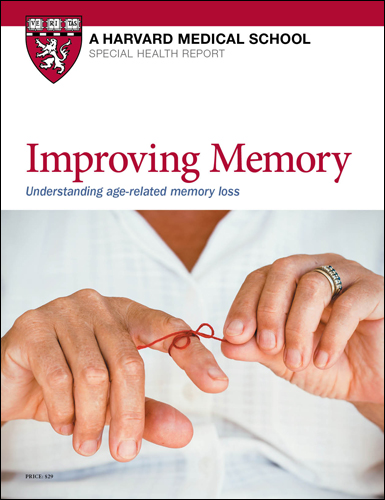Hearts and minds
Vascular disease contributes to up to half of all cases of dementia. But lifestyle changes can prevent or slow down the course of this brain affliction.
- Reviewed by Deepak L. Bhatt, M.D., M.P.H, Former Editor in Chief, Harvard Heart Letter

Alzheimer's disease, the most common and best-known form of dementia, is marked by memory loss, problem-solving difficulties, and mood or personality changes. But autopsy studies show that more than half of people with Alzheimer's disease also have one or more other types of dementia. Most often, it's a syndrome called vascular dementia.
"Over the past 10 years, we've begun to recognize that dementia should be considered as a spectrum of disorders in the brain," says Dr. Anand Viswanathan, a neurologist in the Stroke Service and Memory Disorders Unit at Harvard-affiliated Massachusetts General Hospital. While Alzheimer's and vascular dementia have different underlying causes, there's a great deal of overlap in terms of their symptoms, presentation, and treatment, he says.
Aging brain changes
About one in nine people ages 65 and older have Alzheimer's disease, which features a buildup of proteins called amyloid and tau that disrupt communication between brain cells. However, even healthy older people have small amounts of amyloid plaque in their brains simply as a normal part of aging, says Dr. Viswanathan.
Vascular dementia arises from longstanding, cumulative damage to small blood vessels in the brain. The vessels may thicken or become blocked by blood clots, causing tiny strokes that damage specific parts of the brain important for various thinking abilities. The exact prevalence of the problem isn't clear. What's more, some people have evidence of cerebral small vessel disease (another term for this type of damage) but no apparent symptoms. However, vascular dementia is thought to cause or contribute to up to half of all cases of dementia.
Overlapping symptoms
Short-term memory loss and disorientation are hallmark symptoms of Alzheimer's disease. With vascular dementia, the classic thinking has been that people with this disorder have fewer memory problems but more trouble with executive function, says Dr. Viswanathan. Executive function refers to mental skills that enable people to plan, focus, and juggle different tasks — it's what enables you to navigate around town, prepare a meal, and pay bills. But in reality, it's hard to determine the type of dementia a person has based on symptoms alone, he says.
Testing for dementia (or early signs of the problem, known as mild cognitive impairment) often starts with a brief screening test, such as the Mini-Mental State Exam or the Montreal Cognitive Assessment. If the results suggest a problem, the next steps include longer in-depth neuropsychological testing to assess memory and thinking skills and identify any behavior changes.
Most people with signs of cognitive problems are given an MRI scan to look for structural changes in the brain. While these scans don't show amyloid, they can reveal damage from tiny strokes, which shows up as bright spots called white matter lesions (white matter consists of bundles of nerve fibers that connect brain cells). Nearly every-one over age 60 has these lesions, which may contribute to normal age-related memory loss. However, people with high blood pressure have more extensive white matter damage.
Prevention and treatment
"Keeping your blood pressure in the recommended range of 120/80 or lower has the biggest impact in reducing these brain lesions," says Dr. Viswanathan. You may have heard that after around age 70, having a slightly higher blood pressure reading is a good idea because it improves blood flow to the brain and helps people stay sharp. But that idea is far from proven, he says. Many neurologists agree with their cardiologist colleagues, who advise people to keep their blood pressure as low as possible as long as they don't feel lightheaded, dizzy, or unsteady.
Medications to address the symptoms of Alzheimer's disease, such as donepezil (Aricept) and galantamine (Razadyne) may also help people with vascular dementia. Controlling other risk factors, such high cholesterol and diabetes, is also important.
"I tell my patients that the body and brain are very pliable, even in old age," says Dr. Viswanathan. When people really work on lifestyle changes that improve heart health, like following a Mediterranean diet, getting more exercise, and losing weight, it can slow down changes linked to cognitive decline, he says. The brain has the capacity to form new brain cell connections, which may even improve memory and thinking in some people.
Image: © laflor/Getty Images
About the Author

Julie Corliss, Executive Editor, Harvard Heart Letter
About the Reviewer

Deepak L. Bhatt, M.D., M.P.H, Former Editor in Chief, Harvard Heart Letter
Disclaimer:
As a service to our readers, Harvard Health Publishing provides access to our library of archived content. Please note the date of last review or update on all articles.
No content on this site, regardless of date, should ever be used as a substitute for direct medical advice from your doctor or other qualified clinician.
















